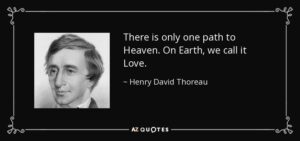Heart-Centered Thinking: The term “evangelical” is both a noun and a verb. I do not associate the word with me as a person. (If you care to know, I consider myself a “Celtic Christian” which, succinctly, means I believe the Divine Power reveals in both nature and in scripture). Having said that, I am “evangelical” about one aspect of the Bible and that is this: Love. As the world continues to change, I am more and more convinced that love–and not technology, politics or economics–holds the key to our future. As I explain in this short video clip, what society must begin doing is use our imaginations and our hearts to create a more beautiful future. [On a different note, my poetry remains another way I try to more fully express my whole self. Here are two short poems I wrote this week: A Prayer for the Rivers and The Canary and the Well. (Note: My concern over the issue of water is captured in this one-minute clip, “The Future of Faith, Farming and Artificial Intelligence,” from a recent keynote I delivered to the American Farm Bureau.)
Think Twice: A few weeks ago, I mentioned that my former “reverse mentor,” Simon Anderson gave me the idea of starting a counterpoint file–a file where you keep information that challenges an idea or belief you currently hold dear. To this point, I am generally bullish on both solar power and agro-photovoltaics but this article on how solar power may be causing catastrophic problems with aquifers around the globe has me re-evaluating my position: Solar-Powered Farming is Quickly Depleting the World’s Groundwater Supply.
Think the Unthinkable: It is hard for me to contemplate the defeat of either America or “The West” and yet, paradoxically, one of the best ways to avoid this very possibility is to contemplate it happening. Personally, I did not enjoy reading this article, “This Prophetic Academic Now Foresees the West’s Defeat,” but it gave me plenty to think about–and I am sure it will do the same for you.
Think Humbly: This excerpt “How Humble Leadership Really Works“–“Servant leaders have the humility, courage, and insight to admit that they can benefit from the expertise of others who have less power than them“–is just one of the article’s many helpful insights. The piece also explains how leaders can use new questions to help their people “think for themselves and try out their own ideas.”
Think Younger: Young people know different information. Not all of this information is necessarily useful or even valuable, but some of it can be. As long-time readers of this newsletter know, I am a big fan of us older folks getting “reverse mentors” for the simple reason that the “different things” these young people know might alert us to threats and opportunities earlier than we might otherwise do on our own. The 8 questions outlined in this article are specific to a certain industry but, whatever your industry, I encourage you to think up a series of questions you may want to ask the youngest person in your company.
Afterthought: ‘You are not obliged to complete the work of the world, but neither are you free to desist from it.” An old Rabbinical saying.
P.S. Did you miss last week’s newsletter? Check it out here.

